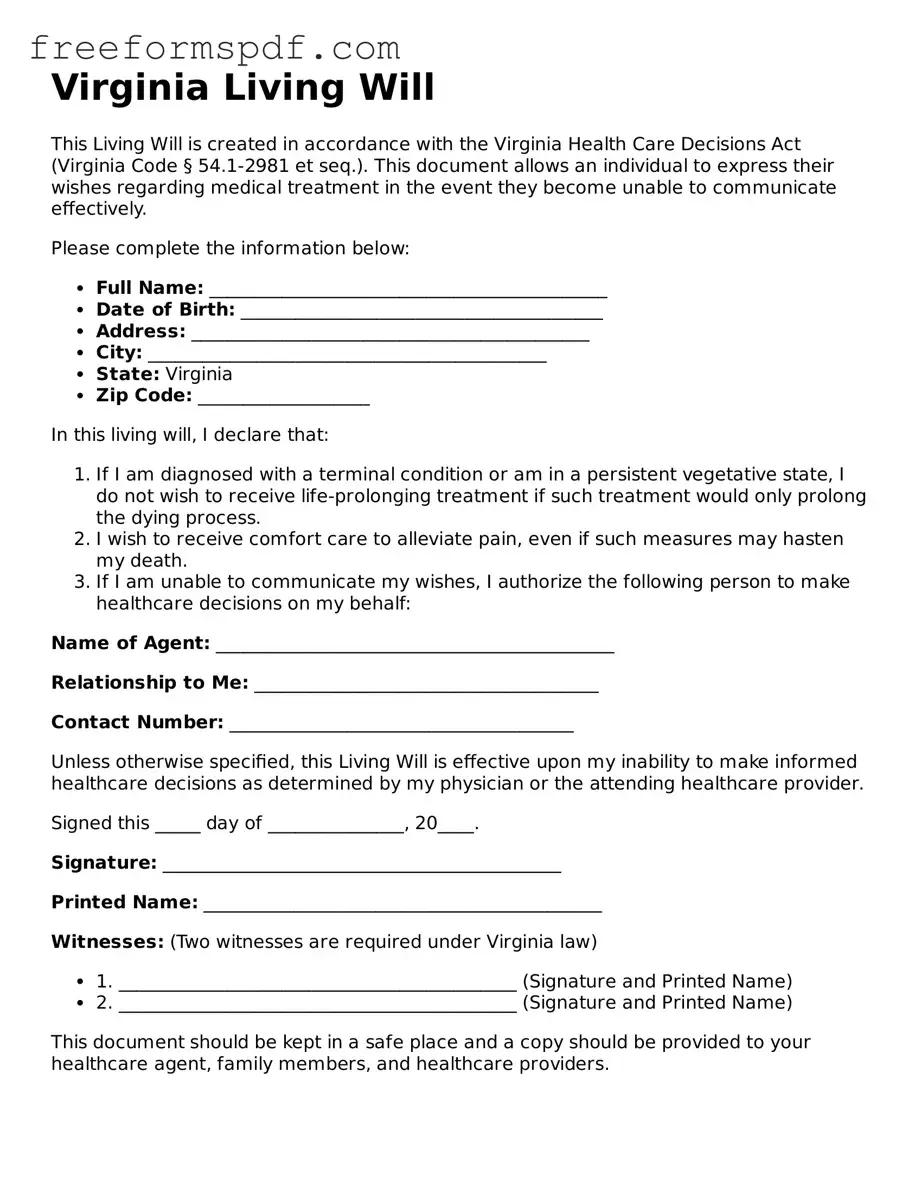Attorney-Verified Living Will Document for Virginia State
Common mistakes
-
Not Clearly Indicating Preferences: Individuals often fail to specify their treatment preferences clearly. Ambiguous language can lead to confusion among healthcare providers.
-
Omitting Important Details: Some people neglect to include crucial information, such as specific medical conditions or scenarios in which they would not want to receive treatment.
-
Forgetting to Sign and Date: A common mistake is not signing and dating the document. Without a signature, the living will may not be considered valid.
-
Not Having Witnesses: In Virginia, a living will must be signed in the presence of two witnesses. Failing to have witnesses present can invalidate the document.
-
Using Outdated Forms: Some individuals may use old versions of the living will form. Always ensure the most current version is used to comply with state laws.
-
Neglecting to Review and Update: After completing the living will, individuals often forget to review and update it as their preferences or health situations change.
Learn More on This Form
-
What is a Virginia Living Will?
A Virginia Living Will is a legal document that allows individuals to express their wishes regarding medical treatment in case they become unable to communicate those wishes themselves. This document specifically addresses end-of-life care and can guide healthcare providers and loved ones in making decisions that align with your preferences.
-
Who should create a Living Will?
Anyone over the age of 18 who wants to ensure their healthcare wishes are known should consider creating a Living Will. It is especially important for individuals with serious medical conditions or those who wish to plan for future healthcare decisions. Having this document in place can provide peace of mind for both you and your family.
-
How do I create a Living Will in Virginia?
To create a Living Will in Virginia, you can either use a template or consult with an attorney who specializes in estate planning. The document must clearly outline your wishes regarding medical treatment, and it should be signed in the presence of two witnesses who are not related to you or beneficiaries of your estate. Once completed, keep the original in a safe place and provide copies to your healthcare provider and family members.
-
Can I change or revoke my Living Will?
Yes, you can change or revoke your Living Will at any time as long as you are mentally competent. To make changes, simply create a new document that reflects your updated wishes, and ensure that you follow the same signing and witnessing requirements. To revoke your Living Will, you can destroy the document or provide a written notice to your healthcare provider and family members.
Misconceptions
When it comes to Virginia's Living Will form, many people have misunderstandings. Here are six common misconceptions:
- A Living Will is only for the elderly. Many believe that only older individuals need a Living Will. In reality, anyone over the age of 18 can benefit from having one, as accidents and unexpected illnesses can happen at any age.
- A Living Will is the same as a Power of Attorney. While both documents are important, they serve different purposes. A Living Will outlines your wishes regarding medical treatment, while a Power of Attorney designates someone to make decisions on your behalf.
- You cannot change your Living Will once it’s created. This is not true. You can update or revoke your Living Will at any time, as long as you are mentally competent to do so.
- Living Wills are only for end-of-life situations. While they often address end-of-life care, Living Wills can also specify your preferences for treatment in situations where you cannot communicate your wishes, such as during a serious illness or injury.
- Health care providers must follow a Living Will. While health care providers generally respect a Living Will, they may not always be legally obligated to follow it in every circumstance. It’s essential to discuss your wishes with your medical team.
- Creating a Living Will is a complicated process. Many people think that drafting a Living Will is difficult. However, it can be straightforward. There are templates available, and you can often complete it without legal assistance.
Understanding these misconceptions can help you make informed decisions about your health care wishes. A Living Will is a valuable tool for ensuring that your preferences are known and respected.
Some Other Living Will State Templates
Living Will Form Pennsylvania - It provides specific guidelines for your medical team to follow regarding treatment.
Texas Living Will and Medical Power of Attorney - You have the right to refuse or accept any medical treatment you choose.
For those involved in the sale or transfer of eligible vehicles, understanding the New York MV51 form is crucial. This certification document not only ensures legal ownership transfer for vehicles that are 1972 or older but also applies to non-titled vehicles. To navigate this process smoothly, you might find valuable resources at NY Templates, which provide templates to assist with proper documentation and adherence to legal requirements.
Does an Advance Directive Have to Be Notarized - With a Living Will, you can specify your desires regarding life-sustaining treatments.
Ny State Living Will - This document is important for anyone over 18 to ensure their wishes are known.
